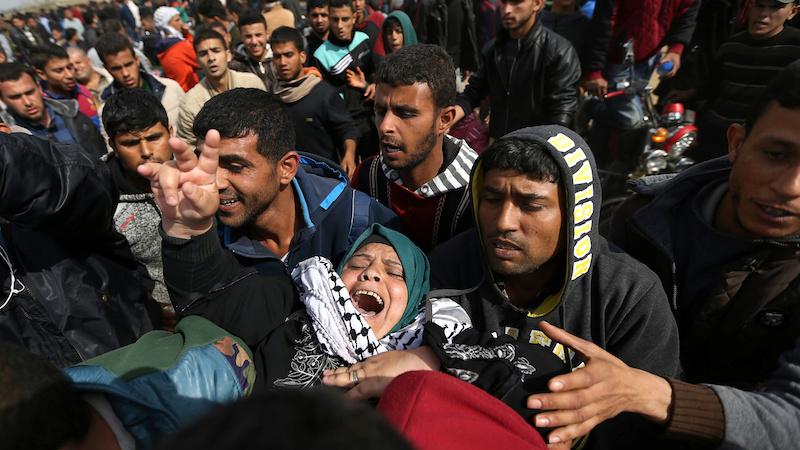Protest leads to bloody clashes on Israel-Gaza border, killing at least nine
A wounded Palestinian woman is evacuated during clashes with Israeli troops during a tent city protest along the Israel border with Gaza.
At least nine Palestinians were killed and hundreds injured by Israeli security forces confronting one of the largest Palestinian demonstrations along the Israel-Gaza border in recent years, Gaza medical officials said.
Tens of thousands of Palestinians, pressing for a right of return for refugees to what is now Israel, gathered at five locations along the fenced 40-mile frontier where tents were erected for a planned six-week protest, local officials said. The Israeli military estimate was 30,000.
Families brought their children to the encampments just a few hundred yards from the Israeli security barrier with the Hamas Islamist-run enclave, and soccer fields were marked in the sand and scout bands played.
But as the day wore on, hundreds of Palestinian youths ignored calls from the organizers and the Israeli military to stay away from the frontier, where Israeli soldiers across the border kept watch from dirt mound embankments.
The military said its troops had used "riot dispersal means and firing towards main instigators." Some of the demonstrators were "rolling burning tires and hurling stones" at the border fence and at soldiers.
At least two of the dead were Hamas operatives, an Israeli military official said.
Palestinian health officials said Israeli forces used mostly gunfire against the protesters, in addition to tear gas and rubber bullets. Witnesses said the military had deployed a drone over at least one location to drop tear gas.
Gaza health officials said one of the nine dead was aged 16 and at least 400 people were wounded by live gunfire, while others were struck by rubber bullets or treated for tear gas inhalation.
The Palestinian protest was launched on "Land Day," an annual commemoration of the deaths of six Arab citizens of Israel killed by Israeli security forces during demonstrations over government land confiscations in northern Israel in 1976.
Right of return
But its main focus was a demand that Palestinian refugees be allowed the right of return to towns and villages which their families fled from, or were driven out of, when the state of Israel was created in 1948.
In a statement, the Israeli military accused Hamas of "cynically exploiting women and children, sending them to the security fence and endangering their lives."
The military said that more than 100 army sharpshooters had been deployed in the area and earth-moving vehicles piled up the dirt mounds to stop any attempt to breach the barrier.
Major General Eyal Zamir, head of Israel's Southern Command, said his forces had identified "attempts to carry out terror attacks under the camouflage of riots."
Hamas, which seeks Israel's destruction, had earlier urged protesters to adhere to the "peaceful nature" of the protest.
Israel has long ruled out any right of return, fearing an influx of Arabs that would wipe out its Jewish majority. It argues that refugees should resettle in a future state the Palestinians seek in the Israeli-occupied West Bank and Gaza. Peace talks to that end have been frozen since 2014.
The protest, which also coincided with Good Friday and the start of the Jewish holiday of Passover, is scheduled to culminate on May 15, the day Palestinians commemorate what they call the "Nakba," or "Catastrophe" when the Israeli state was created.
The protest organizers include Hamas and representatives of other Palestinian factions.
There were also small protests in the Israeli-occupied West Bank, and about 65 Palestinians were injured.
In Gaza, the protest was dubbed "The March of Return" and some of the tents bore names of the refugees' original villages in what is now Israel, written in Arabic and Hebrew alike.
Citing security concerns, Israel, which withdrew troops and settlers from Gaza in 2005, blockades the coastal territory, maintaining tight restrictions on the movement of Palestinians and goods across the frontier. Egypt, battling an Islamist insurgency in neighboring Sinai, keeps its border with Gaza largely closed.
At on Gaza protest site, 80-year-old Mansi Nassar walked towards the frontier with the aid of his cane, disregarding entreaties to remain 2,300 feet from the barrier.
"I was born in Beit Darras inside Palestine and I will accept no less than returning to it," he said, referring to his former home village just south of the modern Israeli city of Ashdod. The village no longer exists.
The story you just read is accessible and free to all because thousands of listeners and readers contribute to our nonprofit newsroom. We go deep to bring you the human-centered international reporting that you know you can trust. To do this work and to do it well, we rely on the support of our listeners. If you appreciated our coverage this year, if there was a story that made you pause or a song that moved you, would you consider making a gift to sustain our work through 2024 and beyond?
